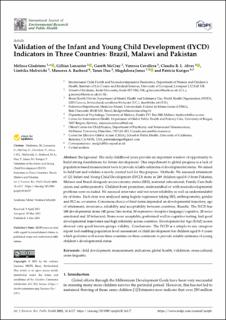| dc.contributor.author | Gladstone, Melissa | |
| dc.contributor.author | Lancaster, Gillian | |
| dc.contributor.author | McCray, Gareth | |
| dc.contributor.author | Cavallera, Vanessa | |
| dc.contributor.author | Alves, Claudia R. L. | |
| dc.contributor.author | Maliwichi, Limbika | |
| dc.contributor.author | Rasheed, Muneera Abdul | |
| dc.contributor.author | Dua, Tarun | |
| dc.contributor.author | Janus, Magdalena | |
| dc.contributor.author | Kariger, Patricia | |
| dc.date.accessioned | 2022-02-07T09:49:47Z | |
| dc.date.available | 2022-02-07T09:49:47Z | |
| dc.date.created | 2022-01-25T12:47:07Z | |
| dc.date.issued | 2021 | |
| dc.identifier.issn | 1661-7827 | |
| dc.identifier.uri | https://hdl.handle.net/11250/2977414 | |
| dc.description.abstract | Background: The early childhood years provide an important window of opportunity to build strong foundations for future development. One impediment to global progress is a lack of population-based measurement tools to provide reliable estimates of developmental status. We aimed to field test and validate a newly created tool for this purpose. Methods: We assessed attainment of 121 Infant and Young Child Development (IYCD) items in 269 children aged 0–3 from Pakistan, Malawi and Brazil alongside socioeconomic status (SES), maternal educational, Family Care Indicators and anthropometry. Children born premature, malnourished or with neurodevelopmental problems were excluded. We assessed inter-rater and test-retest reliability as well as understandability of items. Each item was analyzed using logistic regression taking SES, anthropometry, gender and FCI as covariates. Consensus choice of final items depended on developmental trajectory, age of attainment, invariance, reliability and acceptability between countries. Results: The IYCD has 100 developmental items (40 gross/fine motor, 30 expressive/receptive language/cognitive, 20 socio-emotional and 10 behavior). Items were acceptable, performed well in cognitive testing, had good developmental trajectories and high reliability across countries. Development for Age (DAZ) scores showed very good known-groups validity. Conclusions: The IYCD is a simple-to-use caregiver report tool enabling population level assessment of child development for children aged 0–3 years which performs well across three countries on three continents to provide reliable estimates of young children’s developmental status. | en_US |
| dc.language.iso | eng | en_US |
| dc.publisher | MDPI | en_US |
| dc.rights | Navngivelse 4.0 Internasjonal | * |
| dc.rights.uri | http://creativecommons.org/licenses/by/4.0/deed.no | * |
| dc.title | Validation of the Infant and Young Child Development (IYCD) Indicators in Three Countries: Brazil, Malawi and Pakistan | en_US |
| dc.type | Journal article | en_US |
| dc.type | Peer reviewed | en_US |
| dc.description.version | publishedVersion | en_US |
| dc.rights.holder | Copyright 2021 by the authors. | en_US |
| dc.source.articlenumber | 6117 | en_US |
| cristin.ispublished | true | |
| cristin.fulltext | original | |
| cristin.qualitycode | 1 | |
| dc.identifier.doi | 10.3390/ijerph18116117 | |
| dc.identifier.cristin | 1989444 | |
| dc.source.journal | International Journal of Environmental Research and Public Health (IJERPH) | en_US |
| dc.identifier.citation | International Journal of Environmental Research and Public Health. 2021, 18 (11), 6117. | en_US |
| dc.source.volume | 18 | en_US |
| dc.source.issue | 11 | en_US |

